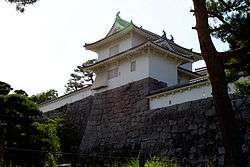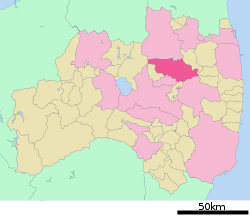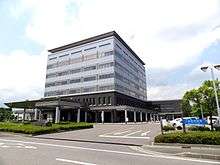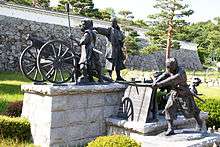Nihonmatsu, Fukushima
Nihonmatsu (二本松市, Nihonmatsu-shi) is a city in Fukushima Prefecture, Japan. As of 1 April 2020, the city has an estimated population of 54,013 in 20,179 households,[1] and a population density of 160 persons per km². The total area of the city was 344.42 square kilometres (132.98 sq mi). The Adachi neighborhood of Nihonmatsu was the birthplace of artist Chieko Takamura, subject of the book of poems Chieko's Sky (智恵子抄, Chiekoshō, literally "Chieko Selections"), written by her husband Kōtarō Takamura.[2]
Nihonmatsu 二本松市 | |
|---|---|
 Minowa Gate in Nihonmatsu Castle | |
 Flag  Seal | |
 Location of Nihonmatsu in Fukushima Prefecture | |
 Nihonmatsu | |
| Coordinates: 37°35′5.5″N 140°25′52.2″E | |
| Country | Japan |
| Region | Tōhoku |
| Prefecture | Fukushima |
| Government | |
| • Mayor | Hiroshi Shinno |
| Area | |
| • Total | 344.42 km2 (132.98 sq mi) |
| Population (April 2020) | |
| • Total | 54,013 |
| • Density | 160/km2 (410/sq mi) |
| Time zone | UTC+9 (Japan Standard Time) |
| - Tree | Sakura |
| - Flower | Chrysanthemum |
| - Bird | Japanese bush warbler |
| Phone number | 0243-23-1111 |
| Address | 403-1 Kanairo, Nihonmatsu-shi, Fukushima-ken 964-8601 |
| Website | Official website |

Geography
Nihonmatsu is located in the Nakadōri section of Fukushima prefecture, between the cities of Fukushima and Kōriyama. It is approximately 250 km from central Tokyo. Nihonmatsu's western border consists of the Adatara mountain range. The Abukuma River runs through the eastern part (forming the border between the former towns of Adachi and Tōwa), flowing from south to north.
- Lakes: Miharu Dam
- Mountains: Mount Adatara (1,728 m), Hiyama (1,054 m), Kohatayama (666.3 m)
- Rivers: Abukuma River
Climate
Nihonmatsu has a humid subtropical climate (Köppen Cfa) characterized by mild summers and cold winters with heavy snowfall. The average annual temperature in Nihonmatsu is 12.0 °C. The average annual rainfall is 1215 mm with September as the wettest month. The temperatures are highest on average in August, at around 25.0 °C, and lowest in January, at around 0.3 °C.[3]
Demographics
Per Japanese census data,[4] the population of Nihonmatsu has slightly declined over the past 20 years.
| Year | Pop. | ±% |
|---|---|---|
| 1920 | 59,895 | — |
| 1930 | 63,929 | +6.7% |
| 1940 | 64,775 | +1.3% |
| 1950 | 79,215 | +22.3% |
| 1960 | 75,634 | −4.5% |
| 1970 | 68,117 | −9.9% |
| 1980 | 66,709 | −2.1% |
| 1990 | 66,988 | +0.4% |
| 2000 | 66,077 | −1.4% |
| 2010 | 59,871 | −9.4% |
History
The area of present-day Nihonmatsu was part of ancient Mutsu Province. It developed as post station on the Ōshū Kaidō highway and as the castle town of Nihonmatsu Domain, a 100,700 koku han, which was ruled by the Niwa clan under the Tokugawa shogunate) in the Edo period. After the Meiji Restoration, it was organized as part of Adachi District in the Nakadōri region of Iwaki Province.
The town of Nihonmatsu was established with the creation of the modern municipalities system on April 1, 1889. Nihonmatsu annexed the neighboring villages of Shiozawa, Dakeshita, Sugita, Ishii and Ohdaira on January 1, 1955 and was elevated to city status on October 1, 1958. The city annexed the towns of Adachi, Iwashiro and Tōwa (all from Adach District) on December 1, 2005.[5]
Government
Nihonmatsu has a mayor-council form of government with a directly elected mayor and a unicameral city legislature of 26 members. Nihonmatsu contributes two members to the Fukushima Prefectural Assembly. In terms of national politics, the city is part of Fukushima 2nd district of the lower house of the Diet of Japan.
Economy
Nihonmatsu is a regional commercial center with a mixed economy. It is especially noted for furniture manufacturing and sake brewing.
Education
Nihonmatsu has 16 public elementary schools and seven public junior high school operated by the city government, and three public high schools operated by the Fukushima Board of Education.
- Fukushima Prefectural Adachi High School
- Fukushima Prefectural Adachi Higashi High School
- Fukushima Prefectural Nihonmatsu Industrial High School
Transportation
Railway
Highway
.png)



International relations


Local attractions

Tourist spot
- Nihonmatsu Castle, also known as Kasumiga Castle, is a historical castle along with a park. Nihonmatsu Castle is one of Japan's Top 100 Castles. Nihonmatsu Castle has also been called one of the top 100 sites in Japan for cherry blossom viewing by Wikivoyage.[6]
- Obama Castle, historical castle ruins
- Dake Onsen, onsen resort located in western Nihonmatsu.
- Ebisu Circuit, famous drift racing track, adjacent to Tohoku Safari Park.
- The Nihonmatsu Lantern Festival is held every October 4–6. The festival has been held annually since 1643 and is one of the three largest lantern festivals in Japan.
Sake
Nihonmatsu has a long history of sake brewing, with several sake breweries headquartered in the city:
- Daishichi, established in 1752, one of the few breweries that continues to use the traditional kimoto brewing process. Tours are available.
- Okunomatsu, established in 1716.
- Ninki Sake Brewery, established in 1897.
- Himonoya, maker of the Senkonari brand sake.[7]
Notable people from Nihonmatsu
- Kan'ichi Asakawa, academic[8]
- Chieko Takamura, artist[2]
- Michiro Endo, musician, political activist
- Yuki Takamiya, long-distance runner[9]
References
- "Population & Households as of March 1 2018" (in Japanese). Official Nihonmatsu city statistics. Retrieved 11 April 2018.
- "The Dreamer of Fukushima -Chieko Takamura". Pref.fukushima.jp. 1938-10-05. Retrieved 2016-03-01.
- Nihonmatsu climate data
- Nihonmatsu population statistics
- 二本松の歴史年表 [Nihonmatsu History by Year] (in Japanese). 二本松市. Retrieved 21 November 2014.
- Voy:Japan's Top 100 Cherry Blossom Spots
- "Senkonari home page". Retrieved 21 November 2014.
- "Utsukushima Fukushima Story - The dreamer : Kan'ichi Asakawa"
- "【東京マラソン】無名28歳・高宮、一般参加から日本人トップでリオ候補浮上 : スポーツ報知". Hochi.co.jp. Archived from the original on 2016-02-29. Retrieved 2016-03-01.
External links
| Wikimedia Commons has media related to Nihonmatsu, Fukushima. |
- Official website (in Japanese)
- Nihonmatsu Tourism Federation (in Japanese)